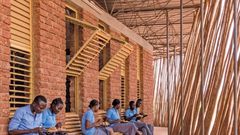Prof. Francis Kéré, Chair of Architectural Design and Participation, comes from Burkina Faso and has been shaped by the inherently strong sense of community and engagement that he grew up with. This is also apparent in his works – soon to include the Anniversary Tower he is planning for TUM.
As a pupil in western Africa, Francis Kéré was already dreaming of building better schools so others could learn more freely one day. He went on to put his native village on the map of international architecture with a series of outstanding places to learn. Today, Francis Kéré researches and builds in Europe as well as in Africa. His projects emphasize simple building, always aligned with local customs and practices. Kéré is a realist for whom the dream remains an important part of the design process. His architecture is socially sustainable because it involves users at an early stage. His pipeline Anniversary Tower for TUM is set to create a meeting point for the scientific community, while also testing out new, material-saving construction methods.
Education and learning connect your architectural work with your teaching. Your father, chief of Gando village in Burkina Faso, enabled you to attend school and then to study. So what does education mean to you?
Francis Kéré: My dad went without. He made sacrifices for my education and he was ridiculed. People couldn’t understand why he would let his firstborn go to school in town instead of getting his help with the field work. But he said to me: “Go and learn how to read and write. Then you can read me the letters that come from the government.” Whether he realized it, I can’t say, but he was a visionary.
And what does education mean for society and for architecture as a profession?
FK: Without education, there is no progress. Education empowers people to develop and advance in life. A society without education would have no access to achievements; to the products of science and culture. It would not be in a position to engage with other communities. In colonial times, knowledge was filtered for local citizens. But it is important to have your own access to knowledge. I work in areas where the words “architecture” and “architect” are unknown. Even today, over sixty percent of the population of Burkina Faso cannot read or write. And if you come from a region where specialist knowledge or expertise essentially doesn’t exist, then knowledge sharing becomes very important.
So being an architect also means sharing knowledge? And you realized early on that you have to convince the people around you in order to put your ideas into practice?
FK: You do have to be persuasive. That’s how you create the right environment – one where others can step up to certain tasks, so you can progress with new ideas yourself.
Read the complete interview (TUM Magazine "Faszination Forschung n23) with Francis Kéré in Englishor German
